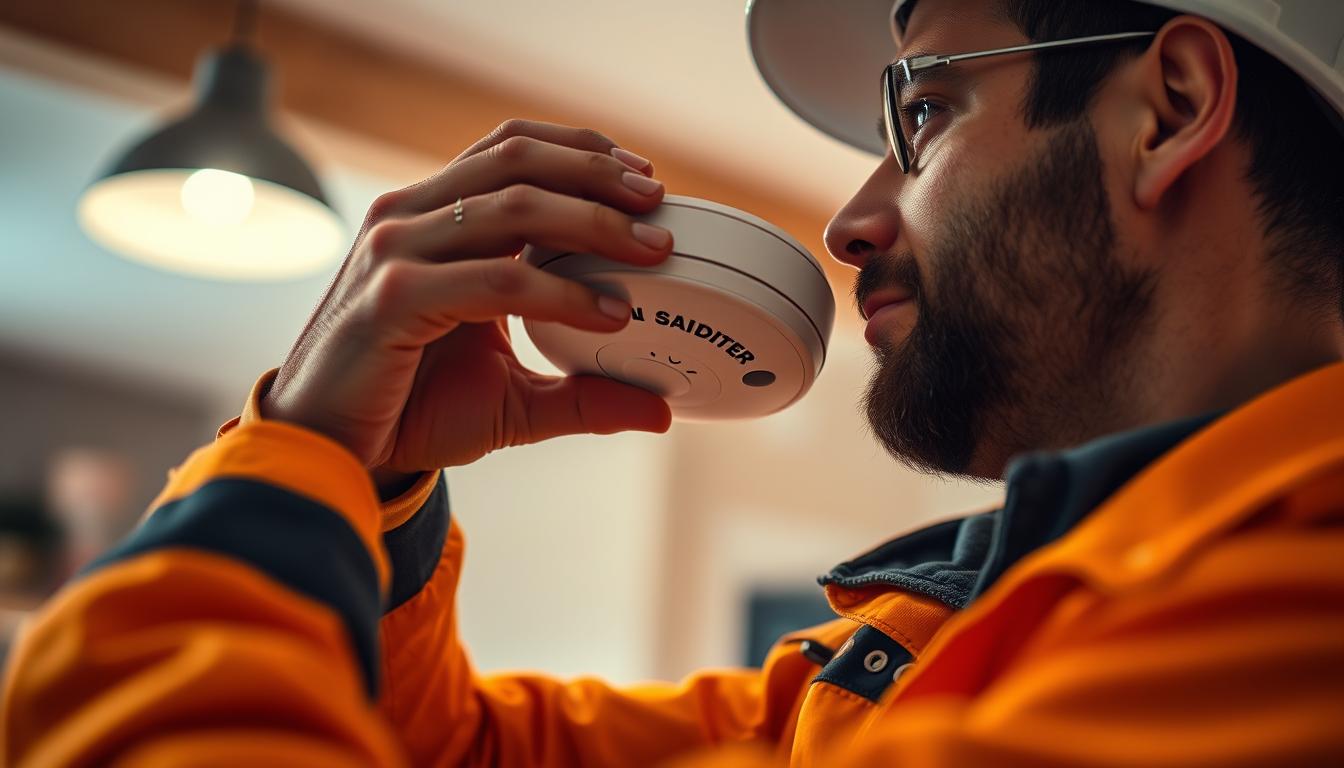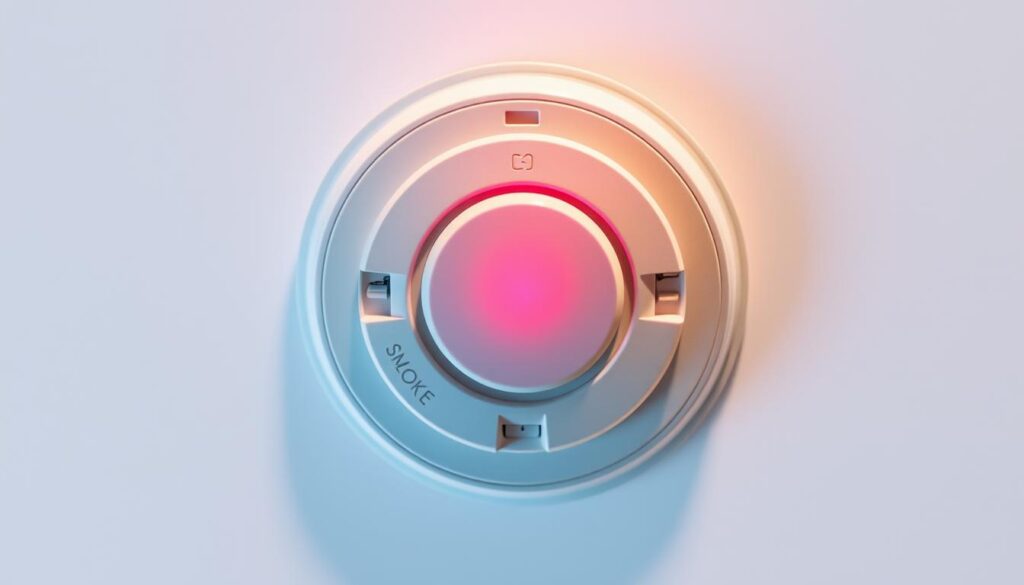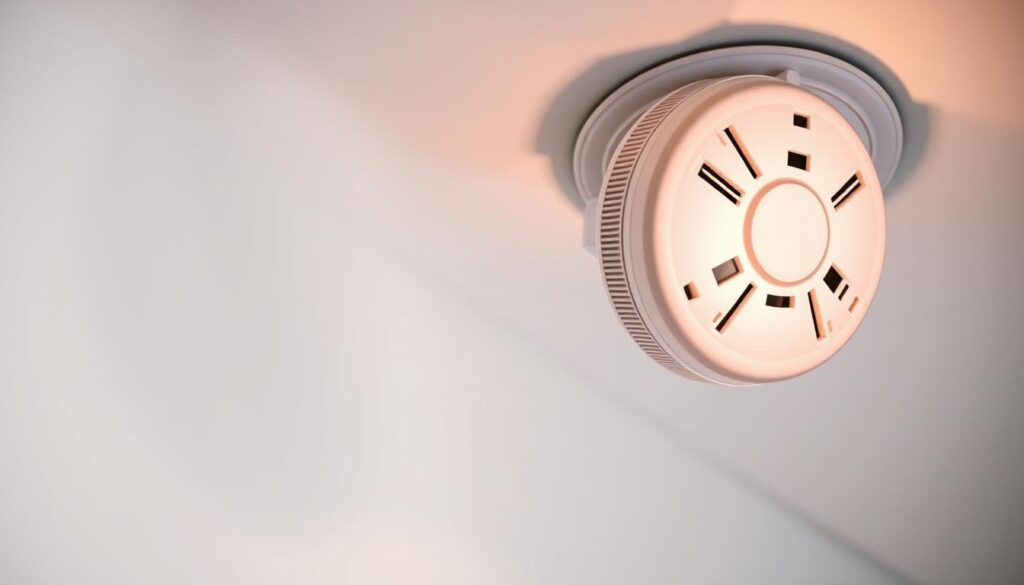Smoke detectors are key to keeping homes safe. But, many wonder when it's time for smoke detector replacement. Experts say to replace them every 10 years. However, if your detector goes off too often or gets dusty, you might need to change it sooner.
Getting a smoke detector installation service from pros is a smart move. They make sure everything is set up right and meets safety standards.
Key Takeaways
- Replace smoke detectors every 10 years, per manufacturer guidelines.
- Beeping or silence during tests signals the need for smoke detector replacement.
- Professional installation services guarantee correct placement and system compatibility.
- Outdated detectors may void insurance policies or fail during emergencies.
- Regular inspections and timely replacements reduce fire-related risks in homes and businesses.
Understanding the Importance of Functional Smoke Detectors
Smoke detectors are more than just household devices—they are lifelines. Proper residential smoke alarm installation ensures these devices work when needed most. Every year, thousands of home fires occur, but early detection can drastically improve survival chances.
"A working smoke alarm cuts the risk of fire-related death by nearly half." – National Fire Protection Association (NFPA)
The Life-Saving Role of Smoke Detectors in Home Safety
Early warning systems save lives. Modern smoke alarm installation practices integrate advanced sensors that detect both smoke and heat, alerting occupants faster. Unlike older models, today’s detectors often include interconnected systems, ensuring simultaneous alerts throughout a home.
Statistics on Fire Incidents in Homes Without Working Smoke Detectors
- 30% of home fire deaths occur in properties without working alarms (NFPA 2023 data).
- Homes with non-functional detectors face 2x higher injury rates during fires.
The Hidden Dangers of Outdated Detection Technology
Outdated detectors may fail silently. Sensors degrade over time, losing sensitivity to smoke particles. A 2022 study by Underwriters Laboratories found:
| Technology Type | Failure Rate |
|---|
| 10+ year-old alarms | 65% failure in critical scenarios |
| Newer models | 95% reliable detection |
Professional residential smoke alarm installation ensures proper placement and technology compatibility, maximizing protection. Ignoring upgrades risks leaving families vulnerable to silent threats like slow-burning fires.
The Lifespan of Modern Smoke Detectors
Modern smoke detectors have a set lifespan to keep us safe. Brands like First Alert and Kidde say most should be replaced every 7-10 years. This matches NFPA guidelines, focusing on safety over saving money.
Manufacturer Recommendations for Replacement Schedules
Top brands give clear replacement times. For instance:
- Kidde alarms: 7–10 years for photoelectric models
- First Alert ionization detectors: 7 years max
- Smart detectors (Nest Protect, Resideo): 10 years
Not following these times can weaken fire detection.
Factors That Affect Smoke Detector Longevity
| Environmental Factor | Impact on Performance |
|---|
| Dust Accumulation | Blocks sensor access to airborne particles |
| Humidity Levels | Causes circuit board corrosion |
| Cooking Fumes | Triggers false alarms and sensor drift |
Signs Your Smoke Detector Needs Immediate Replacement
Replace detectors with these issues:
- Frequent false alarms despite proper smoke detector maintenance
- Unresponsive to monthly test beeps
- Visible corrosion or water damage
- Manufactured before 2016 (pre-advanced sensor tech)
"Persistent chirping after battery replacement is a red flag," says the National Fire Protection Association. "This signals failing internal components, not just low power."
If you're unsure, get a professional smoke detector installer to check. They ensure your system meets NFPA 72 standards. This boosts home safety beyond basic smoke detector maintenance.
Different Types of Smoke Detectors and Their Replacement Timeframes
Modern homes have various smoke detection technologies. Each has its own benefits and lifespan. Knowing these differences helps homeowners pick the best smoke sensor setup and know when to replace them. Here's a look at common types and when they should be replaced:

| Type | Detection Method | Replacement Timeline | Upgrade Notes |
|---|
| Ionization | Identifies fast-flaming fires via radioactive particles | 5–7 years | Less common today; consider smoke alarm system upgrade to photoelectric models for sensitivity to smoldering fires |
| Photoelectric | Uses light beams to detect slow-burning fires | 7–10 years | Recommended for kitchens and living areas due to reduced false alarms |
| Dual-Sensor | Combines ionization and photoelectric tech | 10 years | Best for comprehensive coverage; upgrade every 10 years for latest advancements |
| Smart Smoke Alarms | Wireless connectivity and app integration | 5–7 years | Regular firmware updates required; replace every 5 years for enhanced safety features |
Smart systems need to be updated sooner because of new home automation standards. Ionization models are being replaced in many places because of safety rules. Always check the manufacturer's advice to keep up with the latest smoke sensor setup rules. Upgrading early can help avoid safety gaps, especially with new tech like AI sensors.
Legal Requirements and Building Codes for Smoke Detector Replacement
Smoke detector laws are not just suggestions—they're essential for saving lives. Federal, state, and local codes set strict rules for when to replace them, especially in commercial buildings. Breaking these rules can lead to fines, legal trouble, or higher insurance costs.

Federal Guidelines for Smoke Detector Maintenance
The National Fire Protection Association (NFPA) says all smoke detectors need to be replaced every 10 years. Federal law also requires regular testing and keeping records. Commercial smoke detector service providers often have to submit these records.
State-Specific Regulations You Should Know
States like California and New York have even stricter rules. For example:
- California requires monthly tests for commercial properties
- New York mandates annual inspections for high-occupancy buildings
- Florida requires photoelectric sensors in all new constructions
| Aspect | Federal | State/Local |
|---|
| Replacement Frequency | Every 10 years | Varies (e.g., 7 years in some states) |
| Testing Requirements | Monthly tests | Bi-monthly for multifamily units |
Insurance Implications of Outdated Smoke Detection Systems
“Non-compliance with safety codes can void insurance policies during fire-related claims.”
Insurance companies can penalize policyholders for not replacing smoke detectors on time. For example, Allstate and State Farm say outdated systems might lead to claim denials. Commercial property owners could see their premiums increase by 15-30%, according to 2023 reports.
Using an expert smoke detector technician helps avoid these problems. They update systems to meet current codes, reducing legal and financial risks. They also provide the necessary documentation for insurance audits, helping businesses avoid unexpected costs.
Professional Smoke Detector Installation Service Benefits
Professional smoke detector installation service makes sure systems work right from the start. Experts know how to place detectors for the best results. They avoid problems like airflow issues and ceiling blocks that can lower accuracy.
Why Expert Installation Matters
- Placement expertise: expert smoke detector technicians figure out the best spots, away from windows, vents, and heat sources to avoid false alarms.
- Wiring mastery: Hardwired systems need licensed electricians to keep everyone safe from fire risks.
- Code compliance: Technicians make sure setups follow local building codes, which helps avoid insurance penalties.
Cost Comparison at a Glance
| DIY Installation | Professional Service |
|---|
| Potential for misplacement | Strategic placement guaranteed |
| Risk of voiding warranties | Warranty protections upheld |
| No interconnectivity setup | Whole-home system synchronization |
What Happens During Installation
Here's what you can expect:
- Home assessment: Technician uses scans to find the best spots for detectors.
- Mounting: Units are securely attached with the right brackets and wiring.
- Testing: The system is tested with live fire simulations and checks for signal strength.
- Documentation: You get a report with system details and maintenance advice.
Professional setups last longer and cut down on false alarms by 89% compared to DIY, according to the National Fire Protection Association.
Creating a Comprehensive Smoke Detector Maintenance Schedule
A good smoke detector maintenance plan keeps devices working well between replacements. Start by making a list of all detectors with their install dates. This helps track how old they are. Regular checks also stop malfunctions that could be deadly or lead to expensive insurance fights.
- Monthly: Test alarms with the test button and change batteries in units not hardwired to the home.
- Quarterly: Clean dust from grilles and check if sounds can be heard in every room.
- Annually: Do a full system check, including how units talk to each other in multi-unit setups.
"Documentation is key for commercial properties. Written logs show you follow fire safety codes during checks," says the National Fire Protection Association.
Keep track of detector ages with a spreadsheet or calendar reminders. For commercial smoke detector service needs, focus on systems with similar replacement times. Schedule annual ladder checks for hard-to-reach units. Make sure interconnected systems are tested together to check signal flow.
- Use labeled diagrams to map detector locations
- Highlight units nearing 10-year lifespan milestones
- Include service provider contact details in records
Professionalcommercial smoke detector service providers have custom plans for big systems. They find wiring problems and firmware updates that homeowners might miss. Regular upkeep keeps devices working well and at their best.
Conclusion: Investing in Safety Through Timely Smoke Detector Replacement
Replacing smoke detectors is more than just a task—it's crucial for home and life safety. Old systems can fail without warning, putting families at risk. Federal and state laws require regular updates to keep up with fire safety advancements.
Even well-cared-for detectors lose their effectiveness over time. This makes upgrading them by their 10-year mark a must. Professional checks can uncover problems like sensor issues or wiring damage that regular tests might miss.
Manufacturers like First Alert and Kidde set specific replacement times to meet new safety standards. Waiting too long could mean losing insurance coverage or facing legal trouble. It's not just about following rules; it's about keeping families safe.
By replacing smoke detectors early, you turn maintenance into a safety measure. Homeowners should check their systems, especially if they're old. Remember, upgrading smoke detectors is not just about following the law. It's about preventing disasters and keeping your home's value safe. Waiting too long can put your family in danger when every second counts.
FAQ
How often should I replace my smoke detector?
Most makers say to swap out smoke detectors every 10 years. Sticking to this rule helps keep your alarm system working well.
What are the signs that my smoke detector needs to be replaced?
Watch for constant beeping even with new batteries, a yellowish color, or if it doesn't sound when tested. If you see any of these, get a pro to check it out.
Can I install smoke detectors myself, or should I hire a professional?
You can try to install them yourself, but it's better to get a pro. They make sure everything is set up right for better safety.
Are there differences between residential and commercial smoke detector requirements?
Yes, commercial places need more rules and checks than homes. Knowing your local building codes is key to following the rules.
How do I maintain my smoke detectors to ensure they function properly?
Keep them in check by testing monthly, changing batteries yearly, and getting a pro check every 2-3 years. This keeps them working well.
What upgrades are available for older smoke detection systems?
You can get smart smoke detectors or ones that work with your home's systems. They offer alerts, connect to other devices, and detect better. Talk to a tech for the best upgrade for you.
What can I do if my smoke detector is outdated?
If it's past its prime, it's time for a new one. A pro can pick the right one and install it for you, ensuring your safety.



